
Client Management Software: Boost Efficiency with Powerful Tools
Effective client management is essential for building strong, long-lasting relationships and ensuring customer satisfaction in today’s competitive business landscape. As companies strive to provide exceptional service and retain their valuable clients, the need for robust and efficient client management software has become increasingly apparent. These powerful tools streamline processes, enhance communication, and provide valuable insights, enabling businesses to deliver clients a personalized and seamless experience.
What is Client Management Software?
Client management software is a comprehensive solution designed to help businesses organize, track, and manage their client interactions and relationships. It is a centralized hub for storing client data, managing projects, tracking communication, and monitoring progress. By consolidating client information and activities into a single platform, client management software empowers businesses to streamline their workflows, improve collaboration, and deliver better service and support.
Key Features and Functions
Client Database and Contact Management:
Client management software provides a centralized database to store client information, including contact details, preferences, and interaction history.
It enables efficient client records management, allowing users to easily search, update, and organize client data for quick access and reference.
Project and Task Management:
Users can create and manage tasks and projects related to each client within the platform.
Using task assignment, prioritization, and tracking tools, teams can stay organized and guarantee the timely completion of client-related tasks.
Communication Tracking (Emails, Calls, Notes):
The software tracks all communication channels related to client interactions, including emails, phone calls, and notes.
Users can log and record communications, ensuring transparency and accountability in client communications and follow-ups.
Document and File Sharing:
Client management software facilitates secure document and file sharing between clients and team members.
Users can upload, store, and share documents such as contracts, proposals, and project deliverables, enhancing collaboration and document management efficiency.
Invoicing and Billing Management:
Integrated invoicing and billing functionalities enable users to create, send, and manage invoices directly from the software.
Automated billing procedures simplify the tracking and collecting of payments, cutting down on administrative work and enhancing cash flow management.
Reporting and Analytics:
Insights about customer involvement, project progress, and financial performance are available through robust reporting and analytics tools.
To improve customer relations and business operations, users can create customized reports and dashboards that track trends, measure important indicators, and help them make data-driven decisions.
Calendar and Appointment Scheduling:
Users may manage client engagement appointments, meetings, and deadlines using calendar and scheduling capabilities.
Integration with calendar tools enables automatic syncing of appointments, ensuring scheduling efficiency and avoiding conflicts.
Client Portal and Self-Service Capabilities:
Client portals provide a secure online space where clients can access relevant information, documents, and updates related to their projects or accounts.
Self-service capabilities enable clients to submit requests, track progress, and communicate with their service providers conveniently, enhancing client satisfaction and engagement.
Collaboration Tools and Team Management:
Collaboration features facilitate teamwork and communication among team members working on client projects.
Task assignment, file sharing, and communication tools promote collaboration and coordination, improving productivity and project outcomes.
Integration with Other Business Software (CRM, Accounting, etc.):
Integration with CRM systems, accounting software, and other business tools ensures seamless data exchange and workflow automation.
It eliminates data silos and improves efficiency by centralizing client information and streamlining processes across different departments and functions.
Types of Client Management Software
General Client Management Software:
Comprehensive solutions are suitable for various industries and business types.
Provides many capabilities to manage documents, messages, projects, and client relationships.
Industry-Specific Client Management Software:
Tailored software designed for specific industries such as legal, accounting, consulting, or creative agencies.
Includes industry-specific features and workflows to meet the unique needs of professionals in that field.
Project Management Software with Client Management Capabilities:
Solutions primarily focus on project management and include features such as client interaction and collaboration.
Enables project teams to manage client-related tasks, communications, and documents within the project management platform.
Customer Relationship Management (CRM) Software with Client Management Modules:
CRM platforms that offer client management functionalities as part of their suite of tools.
Allows businesses to track and manage client relationships, communications, sales opportunities, and marketing efforts in one integrated system.
Benefits of Using Client Management Software
Centralized Client Information:
You can access all client data, communication history, and project details in a single location, improving visibility and efficiency.
Streamlined Communication:
Easily manage and track client communication, ensuring timely responses and better collaboration.
Improved Project Management:
Assign tasks, set deadlines, and monitor project progress, ensuring successful delivery of client work.
Enhanced Client Experience:
Provide personalized service, promptly address client needs, and foster stronger relationships.
Increased Productivity and Efficiency:
Streamline operations, eliminate manual data entry, and automate repetitive tasks to increase output and efficiency.
Better Reporting and Analytics:
Gain valuable insights into client activities, project performance, and revenue streams, enabling informed decision-making.
Collaboration and Team Coordination:
Team members should be encouraged to collaborate and share information to improve client support and service effectiveness.
Considerations for Choosing Client Management Software
Features and Functionality:
Ensure the software offers the necessary features to meet client management needs and industry requirements.
Scalability and Growth Potential:
Consider the software’s ability to accommodate business growth and handle increasing client and project volumes.
Integration Capabilities:
Consider how well the program integrates with the various systems and tools you presently use, such as project management, accounting, or CRM software.
Cloud or On-Premises Deployment:
Choose between an on-premises installation and a cloud-based solution based on your IT infrastructure and data security needs.
User Experience and Ease of Use:
Assess the software’s user interface, navigation, and overall usability to ensure a smooth adoption and learning curve for your team.
Vendor Reputation and Support:
Research the vendor’s track record, customer reviews, and the level of support and training provided.
Cost Analysis and Pricing Models
Client management software is typically offered under various pricing models, including:
Subscription-Based Pricing (SaaS):
Users must pay a recurring monthly or annual charge to utilize the software.
Pricing is often based on the number of users or specific features required.
Provides scalability and flexibility, allowing subscription tiers to be changed as needed.
Perpetual Licensing:
Users purchase the software outright with a one-time fee.
Typically includes an annual maintenance or support fee for updates and technical assistance.
Provides long-term ownership of the software with no ongoing subscription costs.
Freemium Models:
Basic features are offered for free to attract users.
Premium features and advanced capabilities are available through paid upgrades or subscriptions.
Enables users to test the program before signing up for a premium plan.
Usage-Based Pricing:
Pricing is based on the volume of data, number of clients, or specific usage metrics.
Suitable for businesses with varying workloads or fluctuating client bases.
Users only pay for what they use, making it a cost-effective option for some businesses.
Top Client Management Software
Accelo
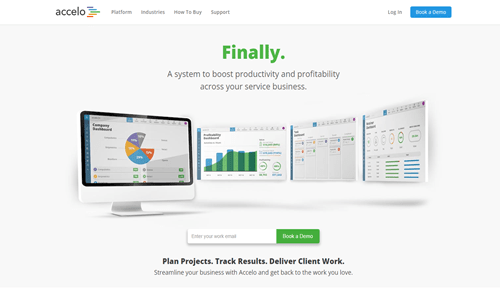
Accelo is a comprehensive client management solution that offers project management, client communication, billing, and more.
Pros:
- Advanced automation features streamline workflows.
- Integration with widely used business software such as Xero and Salesforce.
Cons:
- The steeper learning curve for beginners.
Used For:
Managing projects, clients, and billing in one platform.
Pricing Package:
Starts at $39/user/month.
Wrike
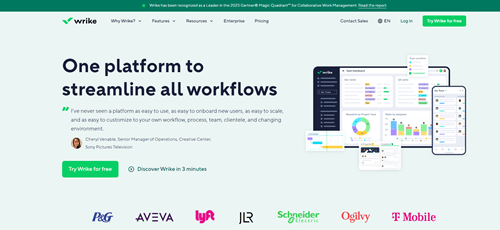
Wrike is a flexible project management platform with client management features that include task management, teamwork, and reporting elements.
Pros:
- Intuitive interface and easy-to-use features.
- Customizable workflows and templates.
Cons:
- Advanced features may require higher-tier plans.
Used For:
We are streamlining project management and client collaboration.
Pricing Package:
Starts at $9.80/user/month.
Insightly
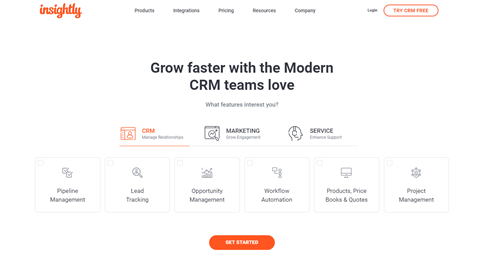
Insightly is a CRM and project management platform designed for small—to medium-sized businesses. It offers lead and contact management, pipeline visualization, and project tracking.
Pros:
- Integration with Google Workspace and Microsoft Office 365.
- Customizable dashboards and reports.
Cons:
- We have limited customization options in lower-tier plans.
Used For:
I am managing contacts, leads, projects, and sales pipelines.
Pricing Package:
Starts at $29/user/month.
Zoho Projects

The cloud-based project management tool Zoho Projects includes task management, time tracking, teamwork, and reporting.
Pros:
- Affordable pricing with a range of features.
- Integration with other Zoho apps like Zoho CRM and Zoho Desk.
Cons:
- The user interface could be more modern.
Used For:
We plan and execute projects with client involvement.
Pricing Package:
Starts at $4/user/month.
Bitrix24
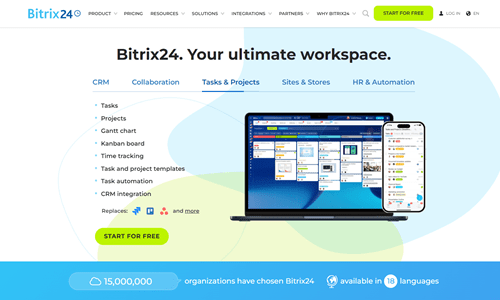
Bitrix24 is an all-in-one collaboration and communication platform with client management features, including CRM, project management, and document sharing.
Pros:
- Free plan available for small teams.
- Wide range of features, including social intranet and HR tools.
Cons:
- Complexity may be overwhelming for some users.
Used For:
Managing client relationships, projects, and team collaboration.
Pricing Package:
Starts at $19/user/month.
Salesforce Client Management
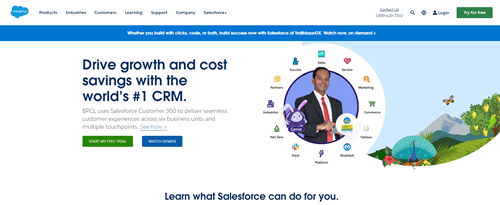
Salesforce offers a robust CRM platform with client management capabilities. It allows businesses to track leads, opportunities, and customer interactions.
Pros:
- Highly customizable to fit various business needs.
- Extensive marketplace for integrations and add-ons.
Cons:
- Higher cost compared to some other options.
Used For:
Managing sales pipelines, customer relationships, and marketing campaigns.
Pricing Package:
Starts at $25/user/month.
HoneyBook
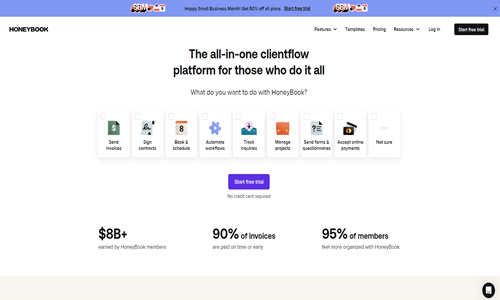
HoneyBook is a client management platform specifically designed for creative professionals and freelancers. It offers features for lead management, proposals, contracts, and invoicing.
Pros:
- User-friendly interface tailored for creative professionals.
- Automation features for streamlining client workflows.
Cons:
- Limited customization options compared to other platforms.
Used For:
We are managing client bookings, projects, and payments for creative businesses.
Pricing Package:
Starts at $9/month.
FreshBooks

FreshBooks is accounting and invoicing software with client management features. It offers time tracking, expense management, and client communication tools.
Pros:
- It has a simple and intuitive interface for small businesses and freelancers.
- Invoicing and payment processing features streamline billing processes.
Cons:
- Limited project management capabilities compared to dedicated project management software.
Used For:
Invoicing, expense tracking, and client communication for small businesses.
Pricing Package:
Starts at $15/month.
Teamwork

Teamwork is a project management and collaboration platform with client management features. It offers task tracking, time billing, and team communication tools.
Pros:
- Comprehensive project management features with client collaboration capabilities.
- Integration with third-party apps like Slack and Google Drive.
Cons:
- The variety of features creates a learning curve for novice users.
Used For:
Managing projects, tasks, and client interactions in one platform.
Pricing Package:
Starts at $10/user/month.
Basecamp
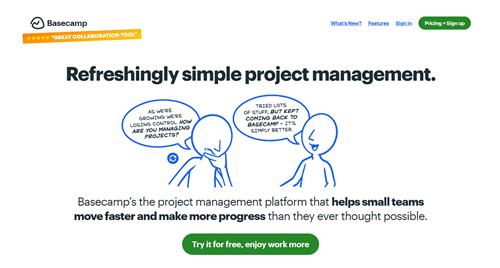
Basecamp, a solution for project management and team collaboration, includes to-do lists, file sharing, message boards, and client management tools.
Pros:
- Simple and intuitive interface suitable for small teams and freelancers.
- All-in-one platform for project management and client collaboration.
Cons:
- It is less feature-rich than other project management software.
Used For:
I managed projects and client communication on a centralized platform.
Pricing Package:
Starts at $99/month for unlimited users.
Implementation and Integration
Successful implementation of client management software often involves several key steps:
Requirements Gathering and Analysis:
Establish your company’s goals, procedures, and needs to ensure the software meets your demands.
Conduct thorough research and consultations with stakeholders to identify key functionalities and features needed to support your client management processes.
Data Migration:
Transfer existing client data, project information, and communication history into the new system.
By validating and cleaning data as necessary, you can guarantee data accuracy and integrity throughout the migration process.
Software Customization and Configuration:
Customize the software’s settings, workflows, and templates to align with your specific processes and preferences.
Configure user permissions, notification settings, and other preferences to optimize usability and efficiency.
User Training and Adoption:
Provide thorough training to ensure your staff is aware of the features and knows how to use the software efficiently.
Offer hands-on training sessions, tutorials, and user guides to support learning and adoption.
Integration with Existing Systems:
Integrate the client management software with other tools and platforms you use, such as CRM, accounting software, or project management tools, for seamless data exchange and visibility.
Analyze integration choices and make sure they integrate with the current systems to prevent data silos and improve workflows.
Ongoing Maintenance and Support:
Regularly maintain the software by applying updates and patches provided by the vendor.
Leverage vendor support services and resources to address technical issues, troubleshoot problems and optimize system performance.
Monitor system usage and user input to spot problem areas and roll out updates as needed.
User Experience and Interface Design
As client management software becomes more widely adopted, user experience (UX) and interface design are crucial in ensuring seamless and intuitive interactions. Key considerations include:
Intuitive Navigation and Information Architecture:
Organize client data, projects, and features in a logical, easy-to-navigate structure, minimizing cognitive load and reducing the learning curve.
Visual Data Representation:
Leverage data visualization techniques like dashboards, charts, and timelines to present client and project information clearly and understandably.
Mobile Responsiveness:
Ensure the software’s interface adapts seamlessly to different screen sizes and devices, enabling users to access and manage client information.
Personalization and Customization:
Allow users to tailor the interface based on their preferences, such as customizing layouts, setting default views, and creating personalized dashboards.
Accessibility and Inclusive Design:
To ensure the software is usable by individuals with diverse abilities and needs, incorporate accessibility features and follow inclusive design principles.
Emerging Trends in Client Management Software
Artificial Intelligence (AI) and Machine Learning:
Predictive insights, automatic job prioritization, and tailored suggestions based on client data and behavioral patterns are all features of AI-powered client management solutions.
Conversational Interfaces and Chatbots:
Chatbots and virtual assistants will enable seamless client communication and support, enhancing the overall customer experience.
Collaborative and Social Features:
Client management software will increasingly incorporate social collaboration tools, enabling real-time communication, file sharing, and project updates with clients and team members.
Integration with Emerging Technologies:
Solutions will utilize state-of-the-art methods for consumer engagement and service delivery, utilizing technologies like the Internet of Things, augmented reality, and virtual reality.
Analytics and Business Intelligence:
Advanced analytics and reporting capabilities will provide deeper insights into client behavior, preferences, and project performance, enabling data-driven decision-making and strategic planning.
Future Outlook for Client Management Software
Combining machine learning with artificial intelligence (AI):
AI-powered features will provide predictive analytics and automate routine tasks.
Machine learning algorithms will enable personalized client experiences and insights.
Emerging Technologies Integration:
Integration with blockchain and IoT devices for enhanced security and real-time data insights.
Automation of data collection processes to streamline client interactions.
Cloud-Based Solutions:
Increased adoption of cloud-based client management software for remote work and digital collaboration.
Seamless access to client data from any location, improving flexibility and scalability.
Focus on User Experience (UX) and Interface Design:
Emphasis on intuitive interfaces and mobile responsiveness to enhance usability.
Features that can be altered to meet different user preferences and corporate demands.
Enhanced Collaboration and Communication:
They improved collaboration tools for teams to share client information and coordinate activities.
Integration with communication platforms to facilitate seamless client interactions and support.
Data Security and Compliance:
We are implementing robust security measures to prevent cyber attacks on confidential client data.
Adherence to data protection laws is required to guarantee confidentiality and privacy.
Scalability and Flexibility:
Scalable solutions to accommodate growing business needs and evolving client demands.
Adaptability to evolving industry trends and shifting market conditions.
Client-Centric Approach:
Shift towards a client-centric approach, focusing on delivering exceptional value and personalized experiences.
Utilization of client feedback and data analytics to drive continuous improvement and innovation.
FAQs.
What is client management software, and how does it benefit my business?
Client management software is a tool created to assist organizations in managing contacts with both present and potential clients. Businesses gain from increased sales and revenue, improved customer interactions, streamlined communication, and improved organization.
How can I pick the best client management software to meet the demands of my company?
To choose the right software, consider your business size, industry, specific features you need (such as contact management, sales tracking, or reporting), integration capabilities with your existing systems, and budget.
Can client management software integrate with other tools I’m already using?
Yes, most client management software solutions offer integration capabilities with other tools, such as email platforms, calendars, accounting software, and CRM systems, ensuring seamless data flow and improved efficiency.
Is my data secure with client management software?
Reputable providers of client management software implement robust security protocols, like encryption, regular security assessments, and compliance with data protection laws, to protect your data. At all times, confirm the supplier’s security features and policies.
Can client management software be customized to fit my business processes?
Many client management software packages offer customization options. These choices let you modify the program to match your unique business processes, workflows, and preferences. Custom fields, layouts, reports, and automation rules are a few examples.
What kind of support and training can I expect when using client management software?
While support and training options differ depending on the supplier, they usually consist of materials such as webinars, user manuals, emails, and live chat assistance. Several suppliers additionally offer devoted account managers and on-site training sessions to help your team get up to speed.
Conclusion
To sum up, client management software is crucial for companies trying to improve their clientele, simplify processes, and spur expansion. Utilizing sophisticated functionalities like contact management, interaction tracking, and reporting helps organizations increase productivity and make wise decisions. The advantages of client management software can be further maximized as it develops by accepting new trends and connecting them with other business tools. Regardless of the size of your company, selecting the best client management software for your requirements can lay the groundwork for long-term success and happy customers.




